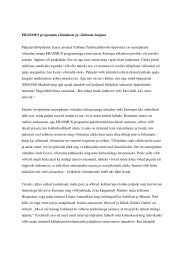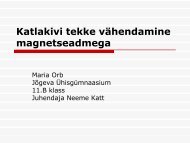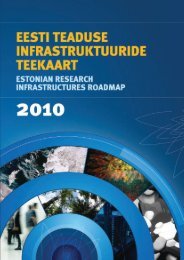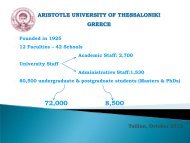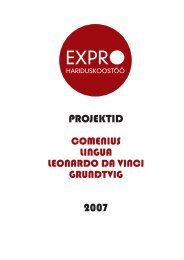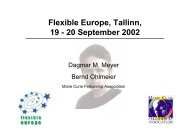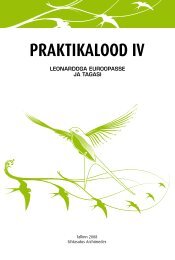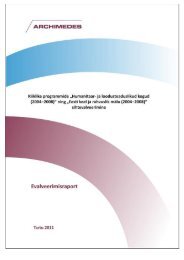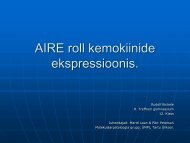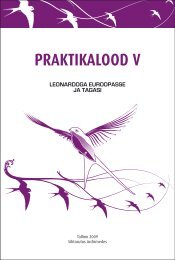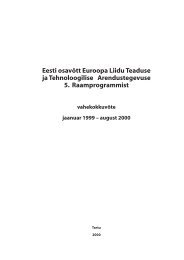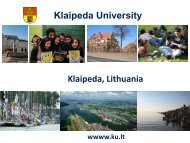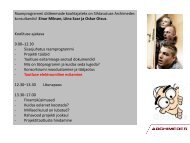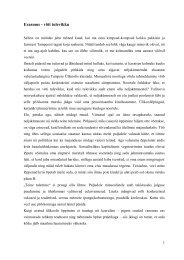- Page 1 and 2:
Grundtvig THE EUROPEAN UNION’S PR
- Page 3 and 4:
Grundtvig LE PROGRAMME DE L'UNION E
- Page 5 and 6:
Grundtvig PROGRAMM DER EUROPÄISCHE
- Page 7 and 8:
TABLE OF CONTENTS A. PER COUNTRY AT
- Page 9 and 10:
The Future of European Cities - Exa
- Page 11 and 12:
Act for Dry Stone in Europe 163 Jou
- Page 13 and 14:
LV-LATVIA 236 Creative Workshop “
- Page 15 and 16:
SK-SLOVAKIA 322 School tinkering 32
- Page 17 and 18:
AT-Austria Workshop Reference numbe
- Page 19 and 20:
Workshop Reference number: 2011-1-A
- Page 21 and 22:
Workshop Reference number: 2011-1-A
- Page 23 and 24:
Workshop Reference number: 2011-1-A
- Page 25 and 26:
Workshop Reference number: 2011-1-A
- Page 27 and 28:
Workshop Reference number: 2011-1-A
- Page 29 and 30:
BE-Belgium Workshop Reference numbe
- Page 31 and 32:
Workshop Reference number: 2011-1-B
- Page 33 and 34:
BG-Bulgaria Workshop Reference numb
- Page 35 and 36:
CY-Cyprus Workshop Reference number
- Page 37 and 38:
Workshop Reference number: 2011-1-C
- Page 39 and 40:
Workshop Organiser: APERIO - Spole
- Page 41 and 42:
Workshop Organiser: MANOFI, s.r.o.
- Page 43 and 44:
DE-Germany Workshop Reference numbe
- Page 45 and 46:
Workshop Reference number: 2011-1-D
- Page 47 and 48:
Workshop Reference number: 2011-1-D
- Page 49 and 50:
Workshop Organiser: International G
- Page 51 and 52:
Workshop Reference number: 2011-1-D
- Page 53 and 54:
Workshop Reference number: 2011-1-D
- Page 55 and 56:
Workshop Reference number: 2011-1-D
- Page 57 and 58:
Workshop Reference number: 2011-1-D
- Page 59 and 60:
Workshop Reference number: 2011-1-D
- Page 61 and 62:
Workshop Reference number: 2011-1-D
- Page 63 and 64:
Workshop Reference number: 2011-1-D
- Page 65 and 66:
perspectives still further. Togethe
- Page 67 and 68:
Workshop Reference number: 2011-1-D
- Page 69 and 70:
Workshop Reference number: 2011-1-D
- Page 71 and 72:
Workshop Reference number: 2011-1-D
- Page 73 and 74:
Workshop Reference number: 2011-1-D
- Page 75 and 76:
and experience the Media world of t
- Page 77 and 78:
manifold traditions of folk music u
- Page 79 and 80: will get back home with a sample ma
- Page 81 and 82: Workshop Reference number: 2011-1-D
- Page 83 and 84: Workshop Reference number: 2011-1-D
- Page 85 and 86: Workshop Reference number: 2011-1-D
- Page 87 and 88: Workshop Reference number: 2011-1-D
- Page 89 and 90: Workshop Reference number: 2011-1-D
- Page 91 and 92: find out how alimentation and preve
- Page 93 and 94: improvisierte Rollenspiele, bei den
- Page 95 and 96: Workshop Reference number: 2011-1-D
- Page 97 and 98: Workshop Reference number: 2011-1-D
- Page 99 and 100: der Herkunftsregion. Aus diesen Erk
- Page 101 and 102: Contact details: Rückertstr. 10 41
- Page 103 and 104: Workshop Reference number: 2011-1-D
- Page 105 and 106: introduction. Next to interactive w
- Page 107 and 108: Workshop Reference number: 2011-1-D
- Page 109 and 110: Workshop Reference number: 2011-1-D
- Page 111 and 112: Contact details: Gruenbergerstr. 73
- Page 113 and 114: Workshop Reference number: 2011-1-D
- Page 115 and 116: Workshop Reference number: 2011-1-D
- Page 117 and 118: Workshop Reference number: 2011-1-D
- Page 119 and 120: Workshop Reference number: 2011-1-D
- Page 121 and 122: Workshop Reference number: 2011-1-D
- Page 123 and 124: Workshop Reference number: 2011-1-D
- Page 125 and 126: Workshop Reference number: 2011-1-D
- Page 127 and 128: Workshop Reference number: 2011-1-D
- Page 129: Workshop Reference number: 2011-1-D
- Page 133 and 134: DK-Denmark Workshop Reference numbe
- Page 135 and 136: Участники получат
- Page 137 and 138: Contact details: Telliskivi 60a 104
- Page 139 and 140: Workshop Reference number: 2011-1-E
- Page 141 and 142: Workshop Reference number: 2011-1-E
- Page 143 and 144: Workshop Reference number: 2011-1-E
- Page 145 and 146: Workshop Reference number: 2011-1-E
- Page 147 and 148: Workshop Reference number: 2011-1-E
- Page 149 and 150: Workshop Reference number: 2011-1-F
- Page 151 and 152: Workshop Reference number: 2011-1-F
- Page 153 and 154: Workshop Reference number: 2011-1-F
- Page 155 and 156: 28/04/12 Arrival in Strasbourg or M
- Page 157 and 158: Présentation des travaux. Atelier
- Page 159 and 160: Workshop Organiser: Contact details
- Page 161 and 162: ayant une compétence particulière
- Page 163 and 164: Workshop Reference number: 2011-1-F
- Page 165 and 166: The content of the workshop will be
- Page 167 and 168: Workshop Reference number: 2011-1-F
- Page 169 and 170: Workshop Organiser: Contact details
- Page 171 and 172: sessions of each participant’s pr
- Page 173 and 174: GB-United Kingdom Workshop Referenc
- Page 175 and 176: Workshop Reference number: 2011-1-G
- Page 177 and 178: Workshop Reference number: 2011-1-G
- Page 179 and 180: Workshop Reference number: 2011-1-G
- Page 181 and 182:
Workshop Reference number: 2011-1-G
- Page 183 and 184:
Workshop Reference number: 2011-1-G
- Page 185 and 186:
Workshop Reference number: 2011-1-G
- Page 187 and 188:
GR-Greece Workshop Reference number
- Page 189 and 190:
Workshop Reference number: 2011-1-G
- Page 191 and 192:
HR-CROATIA Workshop Reference numbe
- Page 193 and 194:
HU-Hungary Workshop Reference numbe
- Page 195 and 196:
Workshop Reference number: 2011-1-H
- Page 197 and 198:
Workshop Reference number: 2011-1-H
- Page 199 and 200:
Workshop Reference number: 2011-1-H
- Page 201 and 202:
IE-Ireland Workshop Reference numbe
- Page 203 and 204:
Workshop Organiser: Contact details
- Page 205 and 206:
and to volunteering associations th
- Page 207 and 208:
Contact details: VIA KENNEDY, 17 42
- Page 209 and 210:
Workshop Reference number: 2011-1-I
- Page 211 and 212:
Workshop Reference number: 2011-1-I
- Page 213 and 214:
Workshop Reference number: 2011-1-I
- Page 215 and 216:
Workshop Reference number: 2011-1-I
- Page 217 and 218:
Workshop Reference number: 2011-1-I
- Page 219 and 220:
Workshop Reference number: 2011-1-I
- Page 221 and 222:
knowledge that, starting from the t
- Page 223 and 224:
consumption ( i.e. organic food, ag
- Page 225 and 226:
alloggiati a Zagarolo e nelle zone
- Page 227 and 228:
The seminar will consist in theory
- Page 229 and 230:
Workshop Reference number: 2011-1-L
- Page 231 and 232:
Workshop Reference number: 2011-1-L
- Page 233 and 234:
Workshop Reference number: 2011-1-L
- Page 235 and 236:
Workshop Reference number: 2011-1-L
- Page 237 and 238:
Workshop Reference number: 2011-1-L
- Page 239 and 240:
Workshop Organiser: Biedriba „Bal
- Page 241 and 242:
Workshop Reference number: 2011-1-N
- Page 243 and 244:
Workshop Reference number: 2011-1-N
- Page 245 and 246:
Expected outputs are: 1/ collection
- Page 247 and 248:
Workshop (including working hours a
- Page 249 and 250:
eliciting necessary information, ta
- Page 251 and 252:
7. Growth of inter-cultural sensiti
- Page 253 and 254:
Expected outputs are: - gaining bas
- Page 255 and 256:
We will provide seniors and youth a
- Page 257 and 258:
One of the most important attractio
- Page 259 and 260:
Workshop Organiser: Fundacja Instyt
- Page 261 and 262:
minutes by public transportation. E
- Page 263 and 264:
All the travel and subsistence cost
- Page 265 and 266:
Food: breakfasts and suppers at the
- Page 267 and 268:
establish new contacts, develop the
- Page 269 and 270:
Application procedure is based on t
- Page 271 and 272:
Workshop Reference number: 2011-1-P
- Page 274 and 275:
Workshop Organiser: Stowarzyszenie
- Page 276 and 277:
Workshop Organiser: Olsztyńskie Pl
- Page 278 and 279:
Workshop Reference number: 2011-1-P
- Page 280 and 281:
Workshop Reference number: 2011-1-P
- Page 282 and 283:
PT-Portugal Workshop Reference numb
- Page 284 and 285:
Workshop Organiser: ACTA - A Compan
- Page 286 and 287:
Contact details: Rua Jau n. º 23,
- Page 288 and 289:
Dia 2 - 2011/11/20 Manhã: Apresent
- Page 290 and 291:
Workshop Reference number: 2011-1-P
- Page 292 and 293:
Workshop Reference number: 2011-1-P
- Page 294 and 295:
of adult education, experiential pe
- Page 296 and 297:
Workshop Reference number: 2011-1-R
- Page 298 and 299:
Workshop Reference number: 2011-1-R
- Page 300 and 301:
Workshop Reference number: 2011-1-R
- Page 302 and 303:
Workshop Reference number: 2011-1-R
- Page 304 and 305:
Workshop Reference number: 2011-1-R
- Page 306 and 307:
Workshop Reference number: 2011-1-R
- Page 308 and 309:
Workshop Reference number: 2011-1-R
- Page 310 and 311:
Workshop Reference number: 2011-1-R
- Page 312 and 313:
Workshop Reference number: 2011-1-R
- Page 314 and 315:
Workshop Reference number: 2011-1-R
- Page 316 and 317:
cultural learning is important? 9.0
- Page 318 and 319:
SI-Slovenia Workshop Reference numb
- Page 320 and 321:
Workshop Reference number: 2011-1-S
- Page 322 and 323:
SK-Slovakia Workshop Reference numb
- Page 324 and 325:
Workshop Reference number: 2011-1-S
- Page 326 and 327:
TR-Turkey Workshop Reference number
- Page 328 and 329:
Contact details: Veterinerlik Fakü
- Page 330 and 331:
Workshop Reference number: 2011-1-T
- Page 332 and 333:
Workshop Reference number: 2011-1-T
- Page 334 and 335:
Workshop Reference number: 2011-1-T
- Page 336 and 337:
Workshop Reference number: 2011-1-T
- Page 338 and 339:
Workshop Reference number: 2011-1-T
- Page 340 and 341:
Workshop Reference number: 2011-1-T
- Page 342 and 343:
Workshop Reference number: 2011-1-T
- Page 344 and 345:
B. IN CHRONOLOGICAL ORDER 344
- Page 346 and 347:
9/10/2011 16/10/2011 The Pillars of
- Page 348 and 349:
3/01/2012 9/01/2012 Young at heart:
- Page 350 and 351:
23/04/2012 29/04/2012 Modern views
- Page 352:
1/07/2012 7/07/2012 It’s never to



